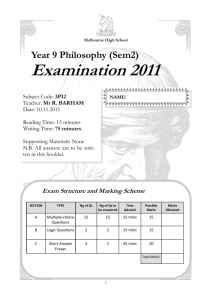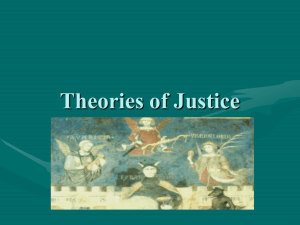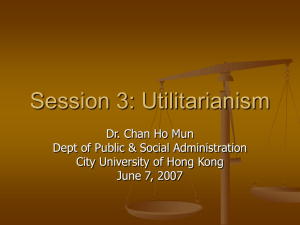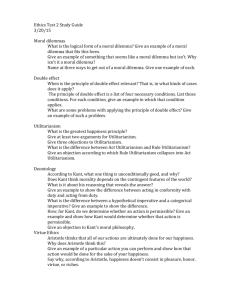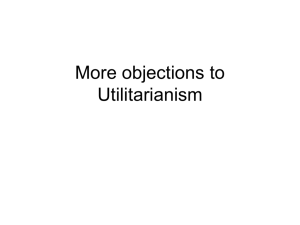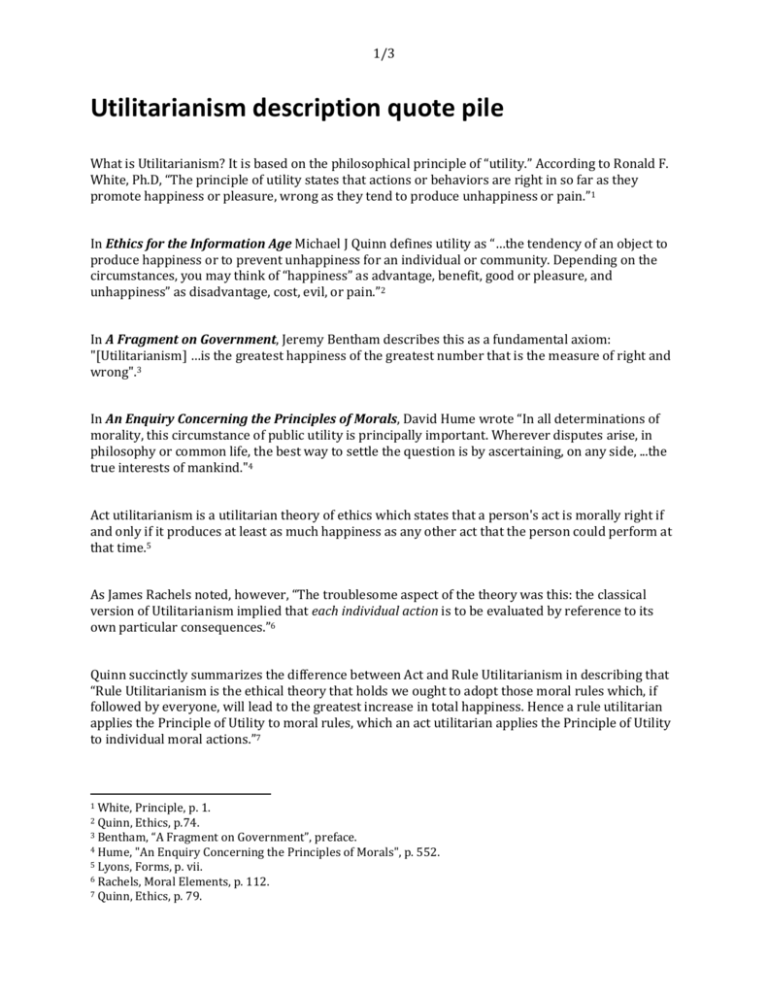
1/3
Utilitarianism description quote pile
What is Utilitarianism? It is based on the philosophical principle of “utility.” According to Ronald F.
White, Ph.D, “The principle of utility states that actions or behaviors are right in so far as they
promote happiness or pleasure, wrong as they tend to produce unhappiness or pain.”1
In Ethics for the Information Age Michael J Quinn defines utility as “…the tendency of an object to
produce happiness or to prevent unhappiness for an individual or community. Depending on the
circumstances, you may think of “happiness” as advantage, benefit, good or pleasure, and
unhappiness” as disadvantage, cost, evil, or pain.”2
In A Fragment on Government, Jeremy Bentham describes this as a fundamental axiom:
"[Utilitarianism] …is the greatest happiness of the greatest number that is the measure of right and
wrong".3
In An Enquiry Concerning the Principles of Morals, David Hume wrote “In all determinations of
morality, this circumstance of public utility is principally important. Wherever disputes arise, in
philosophy or common life, the best way to settle the question is by ascertaining, on any side, ...the
true interests of mankind."4
Act utilitarianism is a utilitarian theory of ethics which states that a person's act is morally right if
and only if it produces at least as much happiness as any other act that the person could perform at
that time.5
As James Rachels noted, however, “The troublesome aspect of the theory was this: the classical
version of Utilitarianism implied that each individual action is to be evaluated by reference to its
own particular consequences.”6
Quinn succinctly summarizes the difference between Act and Rule Utilitarianism in describing that
“Rule Utilitarianism is the ethical theory that holds we ought to adopt those moral rules which, if
followed by everyone, will lead to the greatest increase in total happiness. Hence a rule utilitarian
applies the Principle of Utility to moral rules, which an act utilitarian applies the Principle of Utility
to individual moral actions.”7
White, Principle, p. 1.
Quinn, Ethics, p.74.
3 Bentham, “A Fragment on Government”, preface.
4 Hume, "An Enquiry Concerning the Principles of Morals", p. 552.
5 Lyons, Forms, p. vii.
6 Rachels, Moral Elements, p. 112.
7 Quinn, Ethics, p. 79.
1
2
2/3
Garner and Rosen describe that rule utilitarianism says an action is right as it conforms to a rule
that leads to the greatest good, or in other words "the rightness or wrongness of a particular action
is a function of the correctness of the rule of which it is an instance."8
The Catholic Encyclopedia defines Utilitarianism as “… a modern form of the Hedonistic ethical
theory which teaches that the end of human conduct is happiness, and that consequently the
discriminating norm which distinguishes conduct into right and wrong is pleasure and pain.”9 The
Stanford Encyclopedia of Philosophy notes, “Ethical or evaluative hedonism claims that only
pleasure has worth or value and only pain or displeasure has disvalue or the opposite of worth.”10
Robert Cavalier of the Philosophy Department of Carnegie Mellon states that “Utilitarianism is a
normative ethical theory that places the locus of right and wrong solely on the outcomes
(consequences) of choosing one action/policy over other actions/policies. As such, it moves beyond
the scope of one's own interests and takes into account the interests of others.”11
Garner and Rosen, Moral Philosophy, p. 70.
Fox, Utilitarianism, p. 1.
10 Stanford, p. 1.
11 Cavalier, Utilitarian Theories, p. 1.
8
9
3/3
This quote pile bibliographic entries
Bentham, Jeremy (1776). "A Fragment on Government". http://www.constitution.org/jb/frag_gov.htm.
Retrieved April 15, 2014.
Cavalier, Robert, Utilitarian Theories, Online Guide to Ethics and Moral Philosophy.
http://caae.phil.cmu.edu/cavalier/80130/part2/sect9.html. Retrieved April 15, 2014.
Fox, James. "Utilitarianism." The Catholic Encyclopedia. Vol. 15. New York: Robert Appleton Company,
1912. http://www.newadvent.org/cathen/15241c.htm. Retrieved April 15, 2014.
Garner, Richard T.; Bernard Rosen. Moral Philosophy: A Systematic Introduction to Normative Ethics and
Meta-ethics. New York: Macmillan, 1967. ISBN 0-02-340580-5.
Hume, David (2002). "An Enquiry Concerning the Principles of Morals". In Schneewind, J. B. Moral
Philosophy from Montaigne to Kant. Cambridge University Press. p. 552. ISBN 978-0521003049.
Lyons, David. Forms and Limits of Utilitarianism. Oxford: Clarendon Press, 1965.
Quinn, Michael J. Ethics for the Information Age, 2nd edition. Boston: Pearson Addison Wesley,
2006. ISBN 0-321-37526-2.
Rachels, James. The Elements of Moral Philosophy, 2nd edition. New York: McGraw-Hill, Inc. 1993.
ISBN 0-07-051098-9.
Stanford Encyclopedia of Philosophy. http://plato.stanford.edu/entries/hedonism. Retrieved April 15,
2014.
White, Richard F. “The Principle of Utility”, http://faculty.msj.edu/whiter/utility.htm. Retrieved April 15,
2014.


